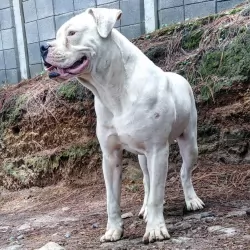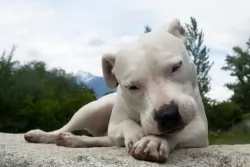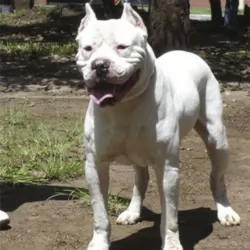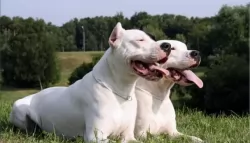 MyDogBreeds
MyDogBreeds Dogo Guatemalteco is originated from Guatemala but Braque Francais is originated from France. Dogo Guatemalteco may grow 9 cm / 3 inches shorter than Braque Francais. Dogo Guatemalteco may weigh 10 kg / 22 pounds lesser than Braque Francais. Dogo Guatemalteco may live 3 years less than Braque Francais. Both Dogo Guatemalteco and Braque Francais has almost same litter size. Dogo Guatemalteco requires Moderate maintenance. But Braque Francais requires Low maintenance
Dogo Guatemalteco is originated from Guatemala but Braque Francais is originated from France. Dogo Guatemalteco may grow 9 cm / 3 inches shorter than Braque Francais. Dogo Guatemalteco may weigh 10 kg / 22 pounds lesser than Braque Francais. Dogo Guatemalteco may live 3 years less than Braque Francais. Both Dogo Guatemalteco and Braque Francais has almost same litter size. Dogo Guatemalteco requires Moderate maintenance. But Braque Francais requires Low maintenance
 Known as the Guatemalteco Bull Terrier or Guatemalan Molosser, the Dogo Guatemalteco is also known as the Bull Terrier Guatemalteco, Guatemalan Bull Terrier, and Guatemalan Molosser.
Known as the Guatemalteco Bull Terrier or Guatemalan Molosser, the Dogo Guatemalteco is also known as the Bull Terrier Guatemalteco, Guatemalan Bull Terrier, and Guatemalan Molosser.
This big Molosser-type dog originates in Guatemala. In the 20th century, it was known as the Bullterrier Guatemalteco, but at the end of the century, it was changed to Dogo Guatemalteco.
Today, while the dog is kept as a companion dog, most are working guard dogs. The Dogo Guatemalteco isn’t recognized by any major international kennel clubs. However, the Kennel Club of Guatemala has given full recognition to this dog and it was in 1981 that the Guatemalan government named the dog as their national dog breed.
 Braque Francais was at first one general breed of hounds in the Gascognes and Pyrenees Mountains areas of France. The one breed became two. Known as the Braque Francais Gascognes and the Braque Francais Pyrenees - two separate breeds of very alike dogs. The Gascognes is a lot less common than his smaller brother. Not very much is known about the beginnings of these two strains of Braque Francais as the breed has been around since at least the 15th century. Because the Braque Francais was exported or taken to so many different countries in the 15th-18th centuries, a lot of the origins of the breeds were lost. A major bloodline search was The conducted in the 19th century and found that these were two very distinct breeds of dog.
Braque Francais was at first one general breed of hounds in the Gascognes and Pyrenees Mountains areas of France. The one breed became two. Known as the Braque Francais Gascognes and the Braque Francais Pyrenees - two separate breeds of very alike dogs. The Gascognes is a lot less common than his smaller brother. Not very much is known about the beginnings of these two strains of Braque Francais as the breed has been around since at least the 15th century. Because the Braque Francais was exported or taken to so many different countries in the 15th-18th centuries, a lot of the origins of the breeds were lost. A major bloodline search was The conducted in the 19th century and found that these were two very distinct breeds of dog.
It is known that France was the birthplace of this breed and it was developed because of a need for a tracker that could point, flush and retrieve. The Braque Francais Gascogne probably came from the south of France. It is related to the German Shorthair Pointer and the English Pointer as well. Having existed since the 15th century, he was the father of all pointing dogs in France. By the 17th century the breed had grown enough to be called the “old style Braque Francais”,
Though the origin of the breed is not known there are of course several theories about it. The most prevalent belief is that the Braque Francais Gascogne is a descendent of the Chien d’Oysel, a spaniel breed of medium size and white or brown with brown markings. The Chien d’Oysel is an ancient breed used for hunting prior to the 13th century. Hunters crossed the Chien with local dogs on a routine basis.
Braque Francais came out of these breedings. It was probably French Scent hounds that created the larger size of the Gascogne. This also increased the stamina and strength of the Gascogne as opposed to the Pyrenees. There was also a mixing in of the Grand Bleu De Gasgogne and the Petit Bleu De Gasgogne.
The other prominent theory is that this breed the Gasgogne was actually developed from the Portugese, Spanish and Italian pointers rather than the French dogs. These dogs originated not with the Chien d’Oysel but with the scent hounds. From these dogs came the Spanish and English Pointers. All that is truly known is that all of these types of dogs were present in Europe by the fifteenth century and were moved among countries and cross bred regularly. However in the part of France called the Central Pyrenees region and in a small southern part of France the original, old style Braque Francais was pure bred. This aspect of the breed contributed to the development of all of the French pointers and European shorthaired dogs. By the end of the 1800’s today’s breed was developed.
In 1850 the first Braque Francais breed club was established and in the breed standards for both dogs followed in 1880. They were then registered in the French Kennel Club and the International Kennel Club (FCI). The French Kennel Club does not allow dogs with any common ancestors in Generations 1-3 into the Club in order to keep out the practice of inbreeding. In Canada only the Gascogne is recognized and the United States’ United Kennel Club (UKC) recognizes both. The American Kennel Club (AKC) does not recognize either.
With most local regions and countries choosing their local dogs over other breeds, the Braque Francais Gascogne has become fairly rare outside of France where the breed was the most popular gun dog throughout the 1700’s. The Gascogne was mostly a dog of the hunting nobility because of its size and food needs. Following the French Revolution, the breed fell off dramatically, while the smaller Pyrenees continued to thrive. This was because in the Pyrenees Mountains and the Southwestern region of Gascony, the English Pointer never supplanted the Braque Francais.
The Second World War was brutal to the Braque Francais Gascognes and as it recovered it became much less common than its sister breed. Today it is found almost exclusively in France.
 The Guatemalteco is a medium to large dog standing at 54 – 60cm and weighing between 40-45kg. He has a short, smooth coat and is essentially white with some black markings on the head.
The Guatemalteco is a medium to large dog standing at 54 – 60cm and weighing between 40-45kg. He has a short, smooth coat and is essentially white with some black markings on the head.
This breed was created from a crossing between a bull terrier, boxer and dalmatian. Some of the dogs are thickly built, while others are more leaner and athletic looking.
The ears of the dog vary quite a bit because while sometimes the ears fold down closely to the head, others are semi-pricked. There are some dog owners who have their dogs ears cropped into fully erect triangular shapes. The eye are small and usually dark brown.
The Dogo Guatemalteco is a fearless, evenly tempered dog. He was bred as a guard dog and he wants to protect his human family, forming a deep bond with them. It makes them difficult to re-home because of this.
It is imperative to have this dog trained and socialized because it might believe its the leader of the pack in your home. He is quite capable of getting along well with children and pets in the home. Because of his dominant nature, he isn’t suited as a pet for the first-time dog owner. He also doesn’t warm easily to strangers.
 The Braque Francais Gascogne is a larger dog than the Pyrenees breed and is a very handsome dog. Both have a deep chest, a solid bodies, strong and slender legs and are well-proportioned. They have padded, round paws and a large brown head with floppy ears. The muzzle is a pointed block and he has a scissors bite, with a black nose and dark or amber eyes. The eyes are very expressive and round. The tail can be straight and long, or it can be docked. They are tall and athletic.
The Braque Francais Gascogne is a larger dog than the Pyrenees breed and is a very handsome dog. Both have a deep chest, a solid bodies, strong and slender legs and are well-proportioned. They have padded, round paws and a large brown head with floppy ears. The muzzle is a pointed block and he has a scissors bite, with a black nose and dark or amber eyes. The eyes are very expressive and round. The tail can be straight and long, or it can be docked. They are tall and athletic.
 Your Dogo Guatemalteco is an intelligent dog breed, and because he is strong-willed and stubborn he might give you a hard time during training. It is possible though and it is important as the training will turn him into an obedient, relaxed dog, able to get on with all his family members, including pets.
Your Dogo Guatemalteco is an intelligent dog breed, and because he is strong-willed and stubborn he might give you a hard time during training. It is possible though and it is important as the training will turn him into an obedient, relaxed dog, able to get on with all his family members, including pets.
He is an energetic dog and will require walks and other forms of exercise each day.
This is certainly not the kind of dog that you buy to protect your property and provide little else for him except food and water. Frustration on the dog’s part can lead to destructive behavior and aggression.
 This is a working breed, but they are nevertheless friendly and loyal to their families. They want to please their people and are usually docile. They love kids and are good as a first ever dog. They are friendly and even-tempered. They tolerate people they do not know but can be shy and are not guard dogs. instead they are loving, affectionate and people oriented. They need to be with their families and never left outside alone. They can develop separation anxiety.
This is a working breed, but they are nevertheless friendly and loyal to their families. They want to please their people and are usually docile. They love kids and are good as a first ever dog. They are friendly and even-tempered. They tolerate people they do not know but can be shy and are not guard dogs. instead they are loving, affectionate and people oriented. They need to be with their families and never left outside alone. They can develop separation anxiety.
 This dog can be susceptible to skin allergies. The skin is sensitive and prone to rashes.
This dog can be susceptible to skin allergies. The skin is sensitive and prone to rashes.
Another health concern with this dog because of his white coat, is congenital deafness. The deafness could be in one- or both ears.
The dog could also experience lameness, of which the most common problem is hip dysplasia. Because skeletal problems occur in this breed, it is advisable for owners to have their pet tested by the Orthopedic Foundation for Animals.
 The Braque Francais is a fairly healthy breed. They are susceptible to certain health conditions that most dogs of their size and working history are susceptible to. These include Patellar luxation which seems to be one of the most common problems for them. They also can have hip and/or elbow dysplasia, aortic stenosis which is a narrowing of the aorta, and some eye issues such as ectropion, entropion, and PRA (Progressive Retinal Atrophy as well as cataracts.
The Braque Francais is a fairly healthy breed. They are susceptible to certain health conditions that most dogs of their size and working history are susceptible to. These include Patellar luxation which seems to be one of the most common problems for them. They also can have hip and/or elbow dysplasia, aortic stenosis which is a narrowing of the aorta, and some eye issues such as ectropion, entropion, and PRA (Progressive Retinal Atrophy as well as cataracts.
 The coat of the dog is short and harsh and it sheds throughout the year. While he is still looked upon as a low maintenance dog, regular brushing will be required twice a week.
The coat of the dog is short and harsh and it sheds throughout the year. While he is still looked upon as a low maintenance dog, regular brushing will be required twice a week.
Because he is a dog breed that is susceptible to skin allergies, bathing isn't necessary as it removes the dog’s natural oils.
Other areas of grooming for this dog are brushing his teeth twice a week, trimming his nails and checking his ears.
Always choose a high quality dog food for your Dogo Guatemalteco and look at the feeding recommendations on the packaging.
When you feed your pet kibble, you can also mix in some cooked brown rice, vegetable and chicken for variety and contentment.
Raw meat is also advised from time to time. Don’t just go on and on through the years feeding your dog the same amount of food, as there are factors to take into account when deciding on food quantity. The age of your dog, it’s stage of life and its activity levels will mean regulating your pet’s food to match his needs.
 This is a high energy, working dog with a need for a high-quality energy food or raw food that you make up yourself. Be sure to include chicken, beef and fish. Feed him about 3 cups once a day or 1.5 cups twice a day.
This is a high energy, working dog with a need for a high-quality energy food or raw food that you make up yourself. Be sure to include chicken, beef and fish. Feed him about 3 cups once a day or 1.5 cups twice a day.
In addition to the conditions listed above, his long floppy ears can lead to ear infections if not cared for. Wash them out daily. He is also susceptible to bloat so don’t feed him large meals and don’t let him exercise or work right before or right after exercise.
These dogs have a variety of hunting skills. They are not only pointers but can flush, trail and retrieve. The Gascogne is not as quick as the Pyrenees. They need a lot of exercise daily or they need a hunting job. They would do well with barn hunt, lure coursing and free play in an off leash fenced in area. If they don’t get rid of their energy, they can be destructive. They were bred to hunt and cannot resist the chase,